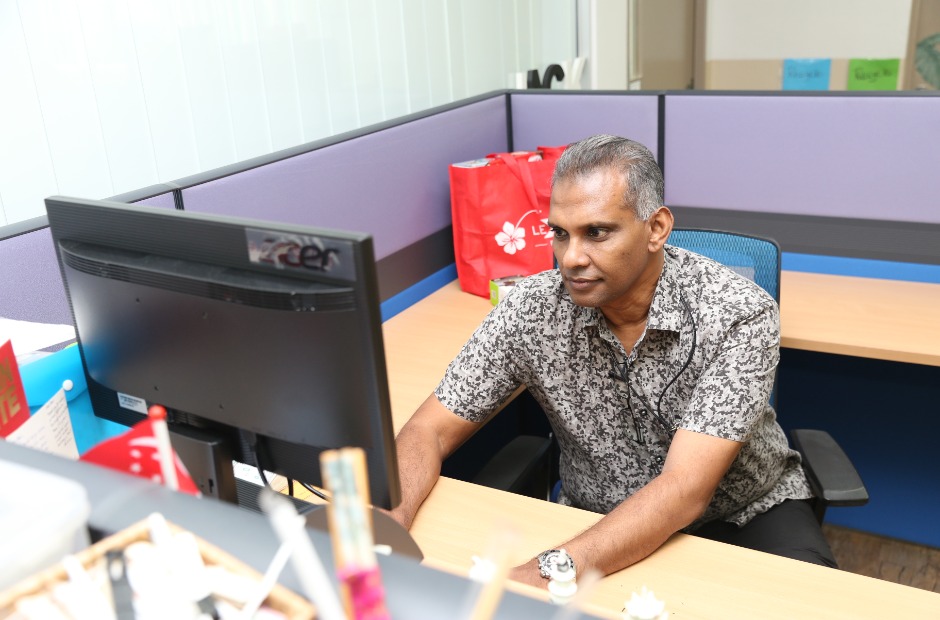Meet the Student Welfare Officers who ‘remove barriers’ for those who find it hard to attend school
20 Feb 2024

Students who come from difficult backgrounds may need more help to thrive at school. SWOs help to spot those at risk and connect them with the right support, so they’re back at school. Schoolbag takes an inside look at the impact of this group of MOE officers, how they reduce absenteeism, and how they reach out to students and families in need.
By Lim Jun Kang
A typical morning for Student Welfare Officer (SWO) Ng Yi Jie involves monitoring student attendance for the day.
It sounds simple enough but she takes the duty seriously.
What may look like a minor issue, of a child not showing up for school for a day, could be the tip of an iceberg, says the SWO at Zhangde Primary School.
“We can’t just say it’s fine because it’s only one or two days,” says Ms Ng. “We want to prevent these ‘one-off’ incidents from escalating into something more serious.”
She works with class teachers and Year Heads to better understand the student’s situation. If there are hints of deeper issues, and a phone call to the parents isn’t enough, the school’s Home Visit Squad is activated. A name coined by the school, the Squad comprises school leaders, Head of Departments, school counsellors, and Ms Ng. They conduct home visits in small groups to ensure the student’s well-being, and to stem any potential slide into long-term absenteeism.
Who are SWOs and what do they do?
Managing long-term absenteeism (LTA) makes up a large part of the Student Welfare Officer’s work. LTA is defined as non-valid absences for at least 20 per cent of school days, and SWOs find ways to help students with LTA to attend school. SWOs also offer support to statutory cases such as child protection or police related cases,
These dedicated MOE officers work with families, schools as well as community partners such as Family Service Centres to find ways to support students in need and their families.
SWO Paul Jeremiah says there are often “multifaceted and complex” reasons why some students struggle to attend school regularly. He describes his contribution as “removing the barriers that prevent students (from coming) to school”.
 Mr Jeremiah attends to cases referred by the Ministry of Education’s Guidance Branch.
Mr Jeremiah attends to cases referred by the Ministry of Education’s Guidance Branch.
While Ms Ng is based in one school, Mr Jeremiah is a “roving” SWO. He currently supports nine schools including Xishan Primary School, where he is based in. He receives cases that are referred by schools in his cluster.
“The reasons are never singular. It could be a result of difficult transitions in a student’s life; family, school changes, experiencing grief or adverse childhood experiences,” he explains.
Long-term absenteeism may become a “vicious cycle”, which is why it is important to help the child get back on track, he explains. “If the child misses school a lot, comes back but struggles to reintegrate socially and academically, he or she may feel lost, and soon lose the purpose to return to school.”
Prevention is better than cure
At Zhangde Primary School, a whole-of-school approach is taken to enhance students’ welfare and prevent long-term absenteeism.
Apart from being on the school’s Home Visit Squad, Ms Ng is also part of the school’s Student Support Team and works closely with teachers, School Counsellors, Special Educational Needs Officers and parents to support student needs in general.
The team regularly conducts professional development sessions for teachers, covering topics such as fostering positive teacher-student and parent-teacher relationships. This helps them establish better rapport with both students and the parents.
Last term, as year-end examinations and PSLE approached, Ms Ng, along with the school counsellors and teacher counsellors, jointly initiated the “Care Hub”. During recess, students could visit the Care Hub to meet the team to learn coping strategies for stress, time management advice or simply share their concerns.
 During recess, a variety of activities await the student visitors at the Care Hub, where Ms Ng and her colleagues are there to meet them.
During recess, a variety of activities await the student visitors at the Care Hub, where Ms Ng and her colleagues are there to meet them.
Bridging student and family with an ecosystem of support
Mr Jeremiah who was an Allied Educator (Teaching and Learning) for over 12 years prior to becoming an SWO, quips, “I used to ‘deal’ with the students inside the classroom, but now I’m outside the classroom looking out for them.”
He considers his role as an SWO to be “a bridge” that connects the child and family to the school and community support.
“We want to support not just the child, but the family as a whole,” he says. “I can tick some boxes when the child goes back to school, and it looks good for my portfolio. But that’s not what we are about. Even when the child graduates from primary to secondary school or beyond, if the family system doesn’t change, the child is going to fall back to square one.”
As such, SWOs often work with community partners such as Family Service Centres, ComLink and Social Service Offices with the objective of lifting the family unit up as a whole.
These partnerships are opportunities for the SWOs to network and access the available resources they can leverage on for the cases they manage. At times, even a simple link-up with the partners can go a long way in improving the family’s situation.
‘There has to be trust before connection can happen’
Building trust and rapport is crucial. In school, Ms Ng does outreach during recess time, making herself “known” to all students, whether they are considered at-risk or not, by visiting the canteen and chatting with them during recess.
She wants to de-stigmatise help-seeking, and encourage all students to approach her, not just those in trouble.
“Also, their peers will help me connect better with the child if they know who I am,” she says.
For at-risk students who are referred to them, patience, empathy and compromise can go a long way in building trust.
“I don’t go in scolding them because of their attendance records. Sometimes I won’t even bring it up. The first thing to do is to get to know them better,” Ms Ng shares.
Recalling a case involving a student who had not been attending school regularly, Ms Ng’s regular efforts to check in on the girl paid off and she eventually opened up to her.
Apart from family issues, the child was also having difficulties coping with her academic work, which further exacerbated her reluctance to go to school.
Ms Ng shared this with the girl’s teachers, who stepped up their learning support. As her self-confidence improved, so did her attitude towards school. Ms Ng shares that the girl even requested to borrow an alarm clock from her so that she could wake up for school in time.
The change of heart led to better school attendance. “I appreciated the effort,” says Ms Ng. “It goes beyond just coming to school.”
Understanding the parents’ struggles
Connecting with the parents can make a difference when supporting a child.
“The processes we employ and the domain knowledge we apply help us in our work, but equally important is the ability to build a common understanding with both the parent and child,” says Mr Jeremiah, adding that SWOs must “never assume that they know better”.
He recalls an encounter with a father of a long-term absentee student, who was initially unreceptive to attempts from the school or community to render support.
When Mr Jeremiah spoke to the student, he found out how the father had gone to great lengths to send and pick up his child to and from school, travelling at least 20km from work in one trip. “When I had the chance to speak to him, I affirmed him on what he did, because it was admirable,” he says. “It’s not flattery, but true affirmation because he did something right.”
A doorway for further conversations opened once the father knew that Mr Jeremiah was not criticising him on the fact that his child was not attending school.
Mr Jeremiah observes that while parents understand that school is important for their child, often, their family situation hinders them from prioritising it. He has encountered a spectrum of parents – some are hands-off while others want help but don’t know who to approach or what to say. Some would heave a sigh of relief when they realise support is available.
“Every parent wants the best for his or her child, and we start from that premise… We’re not here to parent on their behalf, but to empower them to do the parenting,” he adds.
Ms Ng agrees. Besides acknowledging the family’s difficulties, it is also important for SWOs to affirm the parents’ efforts.
“We will explore ways in which we can help their children be more independent, like going to school by themselves, and parents are usually open to it,” she says.
“Even when parents drop me a message to tell me their child will be late, but coming to school, I appreciate it. It shows that there is room for me to gently challenge them a little more and see what else can be done to improve the situation.”
To parents who are facing difficulties supporting their child, Ms Ng says, “Raising a child is not a sprint. It can be emotionally taxing at times. We know that parents are trying their best.”
For more stories on support systems in schools:
- One moment please, while I write a note – and other ways students find support through their school counsellor
- Questions about courses and careers ahead? An ECG counsellor can point the way
We are on Telegram! Subscribe to our channel: https://t.me/schoolbag_edu_sg




